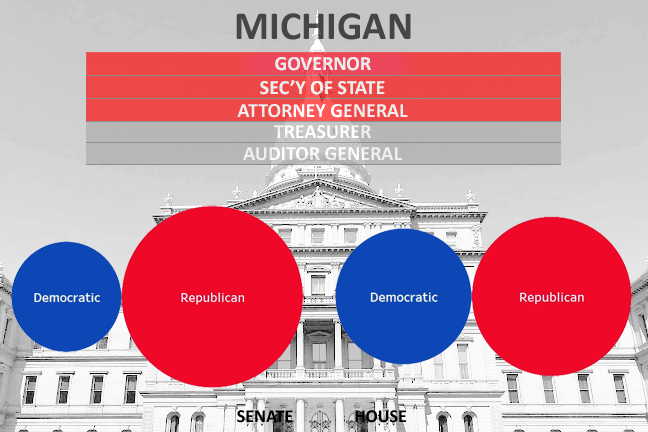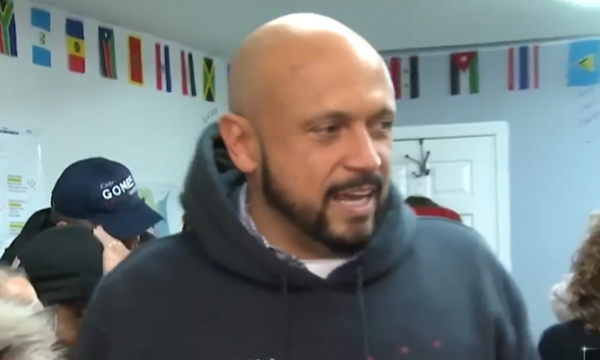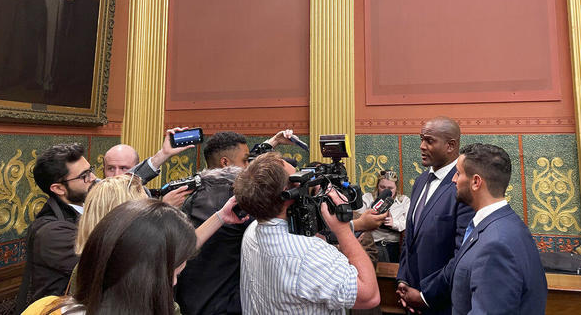Legislative Snapshot: Michigan
The end of May finds Lansing with much on its plate. The legislature continues to wrestle with crafting school safety reforms in the wake of the Parkland, Florida shooting. Meanwhile, it seems likely that the question of marijuana legalization will be put to the voters on the ballot in November. And in his final year as governor, Rick Snyder’s administration is working to implement new, strict drinking water rules for lead.

School Safety
After the deadly shooting on Feb. 14 at Marjory Stoneman Douglas High School in Parkland, Florida, school safety was thrust into the national spotlight. The Michigan legislature and Gov. Rick Snyder are currently working on HB 5828 in response.
This bill would create a school safety commission to review procedures in Michigan schools and develop more resources for security improvements in school buildings across the state. It also calls for a liaison in each school district that would be charged with reporting to and working with the commission.
Other parts of the plan would enhance training for new law enforcement officers, require reporting of school incidents and threats, and mandate more attention to safety in new school construction.
In the Michigan Senate, SB 601 was unanimously approved on Apr. 27. The Senate bill would set aside $18.6 million in grants for schools to upgrade security systems. It would also create a statewide “panic button” system to help all Michigan schools promptly summon police during emergencies.
Marijuana Legalization
The question of whether to make recreational marijuana legal in Michigan appears headed to the November ballot. Now that the State Board of Canvassers has certified that the petition campaign has gathered enough signatures, the legislature has 40 days to approve the measure, otherwise it will go the ballot. Because Speaker of the House Tom Leonard (R) has already stated that the issue will not be brought up for a vote in the House, it is likely this issue will be decided at the ballot box.
Michigan voters have already weighed in on marijuana once, approving cannabis for medical use in 2008 by a 63%-37% margin.
The new ballot proposal would legalize the possession and sale of up to 2½ ounces of marijuana for recreational use, while also imposing a 10% excise tax, in addition to a 6% sales tax. These tax revenues would be split, with 35% going to K-12 education, 35% to roads, 15% to the communities that allow marijuana businesses in their borders, and 15% to counties where marijuana business are located.
Drinking Water Regulations
Stung by reaction to the three-year-old water crisis in Flint, Gov. Rick Snyder’s administration is nearing completion of the country’s strictest drinking water rules for lead. Despite opposition from municipalities and utilities, this plan will call for the eventual replacement of all 500,000 lead service pipes in Michigan.
The proposed lead and copper rules, first announced in 2016 and formally unveiled in 2017, will take effect unless a legislative committee objects by June. Lawmakers are unlikely to intervene further, after already nudging the state Department of Environmental Quality to scale back parts of a proposal that could still cost the state as much as $2.5 billion.
Under the proposed policy, the “action level” for lead would drop from the current federal limit of 15 parts per billion (ppb) to 12 ppb in 2025. Underground lead service lines connecting water mains to houses and other buildings would be replaced by 2040, unless where a utility proves it needs more time to execute a specialized plan to repair and replace its water infrastructure.
The rules also would prohibit the partial replacement of lead service pipes except for emergency repairs; require preliminary and final inventories of the lines and other components of a water supply by 2020 and 2025, respectively; and ensure that samples are taken at the highest-risk sites, with methods designed to most accurately detect lead. Additional changes in the law would help verify that corrosion control is working and take more steps to educate the public about lead in water.
Electoral Outlook
With Gov. Snyder stepping down due to term limits, a competitive race to succeed him is well underway. The current slate includes three Democrats, four Republicans, and two Libertarians. All 38 State Senate seats and all 110 House of Representatives seats will be up for election in November as well. Republican and Democrat primaries for all these offices will be held on Aug. 7.
Michigan has been a Republican trifecta since 2011, after Republicans won the governor’s office and both chambers of the State House in 2010, amid a Republican midterm “wave.” Geographically, Republicans control most of the state, with Democratic voters concentrated in the Detroit metropolitan area and a few other well-distributed urban pockets.


